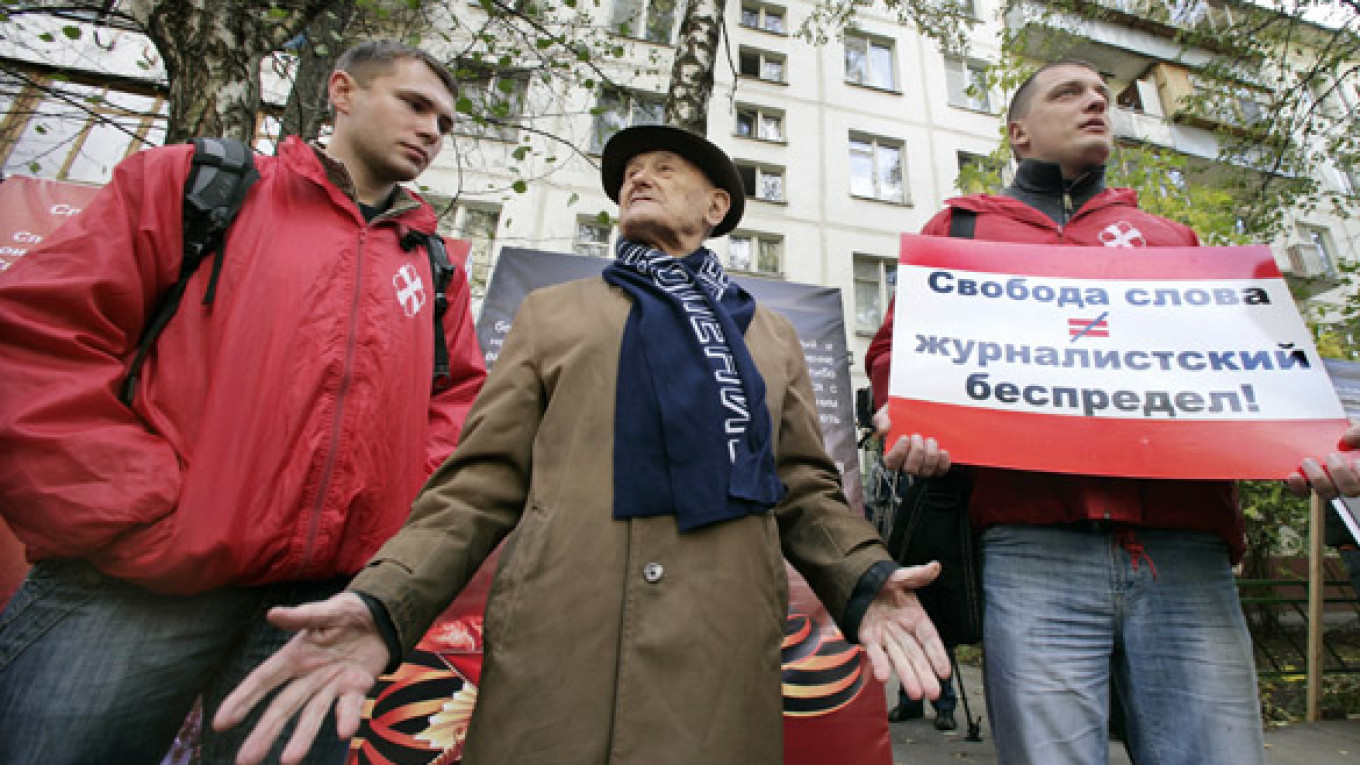Nashi members picketing outside the home of journalist and human rights activist Alexander Podrabinek are violating at least five articles of the Constitution and inciting hatred, the Kremlin’s human rights council said Monday.
The watchdog, led by Ella Pamfilova, called the protests “a persecution campaign … organized by irresponsible adventurists from Nashi” and said the activists were showing open signs of extremism.
The pro-Kremlin youth group enlisted about 100 veterans to continue their protest Monday, which began Sept. 29 after Podrabinek published an article criticizing the Moscow Union of Veterans.
Podrabinek suggested that the veterans group’s members were former “camp guards” and “executioners” for demanding that a Moscow restaurant change its name from Antisovetskaya, or Anti-Soviet, to Sovetskaya. The restaurant’s owner said he was forced to change the name under pressure from Oleg Mitvol, prefect for the Northern Administrative District. The veterans group had complained to Mitvol.
The Kremlin’s human rights council said Nashi was in violation of Articles 23, 24, 25, 27 and 29 of the Constitution. Among other things, the articles guarantee: the inviolability of personal life and home; that a citizen’s personal information will not be spread without his consent; the right to choose one’s residence; and the rights to freedom of thought and conscience, including a freedom from pressure to retract or alter one’s beliefs.
Those who disagree with Podrabinek should answer his article in kind, and if they feel that his criticism infringed on anyone’s rights or broke the law they should turn to the courts, the council said in a statement.
“The council expresses its deep regret and disturbance over Nashi’s actions, which not only recall the shameful Soviet persecution campaigns against dissenters. … They also give Russia’s young people an unabashed example of legal nihilism,” it said, using President Dmitry Medvedev’s term for widespread disregard for the law.
It also called on the authorities to investigate Nashi’s actions for extremism and to protect Podrabinek.
Podrabinek went into hiding, writing on his blog Sept. 28 that he had received “information from credible sources that a decision has been made at quite a high level to dispose of me in any possible way.” The harassment campaign has drawn international attention, including from French Foreign Minister Bernard Kouchner, who said he raised the issue during a visit to Moscow on Thursday.
Podrabinek, a human rights activist since the 1970s and head of the Prima-News news agency, also works for publications such as the Russian-language service of Radio France International and Novaya Gazeta.
Nashi, which has maintained close ties to founder Vasily Yakemenko, now head of the Federal Agency for Youth Affairs, has been known to hound opponents in the past, including opposition politicians and foreign dignitaries.
Nashi leader Nikita Borovikov defended the picket as part of an attempt to hold journalists and human rights activists responsible for their perceived misdeeds in the media.
“Respect for old age and the trials these people went through are natural for any decent person, and when he loses it, he ceases to be a person. The Nashi movement is a patriotic organization and one of its tasks … is to defend the honor and dignity of veterans,” Borovikov said in a statement on the group’s web site. “We won’t let Podrabinek continue posing as a victim.”
The group’s statement also included an Associated Press photo showing Nashi activists videotaping the delivery of a letter from the veterans in Podrabinek’s mailbox, which appeared to be open. The activists will continue to place the letter in his mailbox every day, the statement said.
At Monday’s rally, activists dressed in trademark red jackets and veterans rallied with posters carrying World War II symbols and posters saying, “The freedom of the press doesn’t mean lawlessness in journalism.”
Municipal authorities have authorized the ongoing rally.
Tatyana Lokshina, a researcher with Human Rights Watch, said she couldn’t recall any other case where Nashi had campaigned against a journalist. “Hopefully, the [Kremlin] watchdog’s appeal will draw more attention to the problem in the government,” Lokshina said.
A Message from The Moscow Times:
Dear readers,
We are facing unprecedented challenges. Russia's Prosecutor General's Office has designated The Moscow Times as an "undesirable" organization, criminalizing our work and putting our staff at risk of prosecution. This follows our earlier unjust labeling as a "foreign agent."
These actions are direct attempts to silence independent journalism in Russia. The authorities claim our work "discredits the decisions of the Russian leadership." We see things differently: we strive to provide accurate, unbiased reporting on Russia.
We, the journalists of The Moscow Times, refuse to be silenced. But to continue our work, we need your help.
Your support, no matter how small, makes a world of difference. If you can, please support us monthly starting from just $2. It's quick to set up, and every contribution makes a significant impact.
By supporting The Moscow Times, you're defending open, independent journalism in the face of repression. Thank you for standing with us.
Remind me later.


